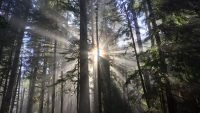Where to Scatter ‘Ashes’ on the West Coast
Update: Solace is now Tulip Cremation, the nation’s largest online direct cremation services provider, delivering world-class and compassionate care 24/7.
Though there are no health hazards associated with cremation “ashes” (officially cremated remains), there are a few things you should know before you plan your scattering.
There are many popular options for scattering, as the folks at Better Place Forests have outlined here.
Public and private scattering
According to Nolo.com’s do-it-yourself legal advice, you should use common sense when scattering ashes. The site has information about Oregon, Washington and California scattering laws.
Many cemeteries offer (for a price) land with scattering gardens. You usually will also be sold a marker or plaque on a wall or stone that will list your loved one along with others in the garden.
You may also scatter on your own private land. However, if you allow others to scatter there, you must be licensed and the land be used only for cemetery purposes, according to the Oregon Mortuary and Cemetery Board.
If you are scattering on someone else’s private land, you’ll want to contact the landowner for permission.
California scattering laws
California’s cremation scattering rules echo the advice above and permit scattering with the following guidelines:
- Scattering in areas of the State where no local prohibition exists and with written permission of the property owner or governing agency. The cremated remains must be removed from the container and scattered in a manner so they are not distinguishable to the public.
- Scattering in a cemetery scattering garden.
- Scattering at sea, at least 500 yards from the California shore (federal rules require three nautical miles). This also includes inland navigable waters, except for lakes and streams.
Cremated remains may not be transported without a permit from the county health department and they may not be disposed of in refuse.
Parks
National Parks generally approve requests for scattering of ashes. Each park handles the request process separately. Generally, looking at the National Park website for the park you are considering is the best place to start. For example, Oregon’s Crater Lake, Washington state’s Olympic National Park and California’s Sequoia and Kings Canyon National Parks and Yosemite all offer permit information online.
For other federal lands, you’ll want to check with the agency that manages the land (for example, the Bureau of Land Management). Our friends at Cake have a nice wrap-up of additional advice on national and state park scattering.
In short, you’ll always want to check with local, state and federal regulations before scattering, and with COVID, make sure you are following the guidance of health officials about how many others can join you if you plan to have a small outdoor ceremony.
Scattering ashes at sea
The federal Clean Water Act requires that cremated remains be scattered at least three nautical miles from land. If the container will not easily decompose, you must dispose of it separately. The EPA does not permit scattering at beaches or in wading pools by the sea. Finally, you must notify the EPA within 30 days of scattering ashes at sea.
For more information, see the EPA website page on Burial at Sea.
Scattering ashes by air
While there are no state laws regulating ashes spread by air, federal aviation laws prohibit dropping any objects that might cause harm to people or property. The U.S. government does not consider cremains to be hazardous material, but it will be important to remove the cremains from their container before scattering. Traveling with cremated remains is legal, but can be difficult, so make sure to be prepared before heading to the security gate.
Beaches, lakes and rivers
According to the EPA, lakes, rivers and other inland water are not subject to the federal rules of MPRSA (Marine Protection, Research and Sanctuaries Act) but are governed by the Clean Water Act. State and local rules vary and you may be required to obtain a permit. The EPA suggests you contact local environmental or health agencies or a mortuary board to find out what the rules are in the area you are considering.
Questions?
For questions about laws regulating the scattering of cremated remains in Oregon, you can contact the Oregon Mortuary & Cemetery Board. In Washington State, contact the Funeral and Cemetery Board. In California, you can find information on the Cemetery and Funeral Bureau website.
Wherever you scatter, we hope the location is a meaningful one for your and your loved ones.
Photo by John Doyle
Solace is now Tulip Cremation, the nation’s largest online direct cremation services provider, delivering world-class and compassionate care 24/7.
Proudly providing:
Denver cremation services
Los Angeles cremation services
Portland cremation services
San Francisco cremation services
Seattle cremation services



